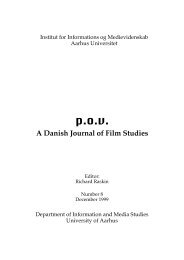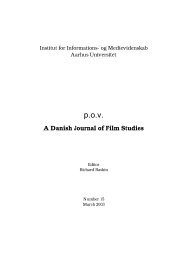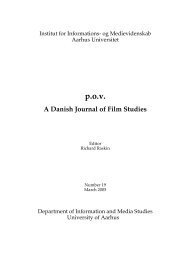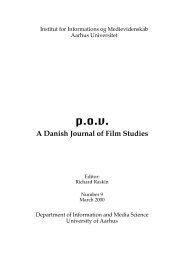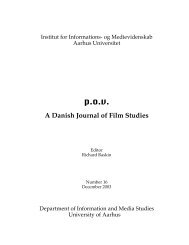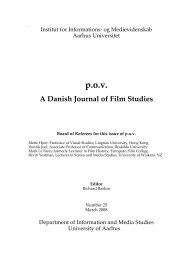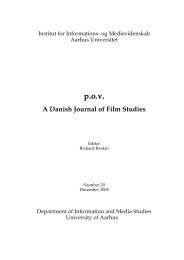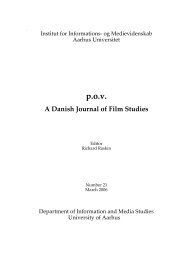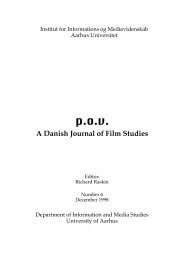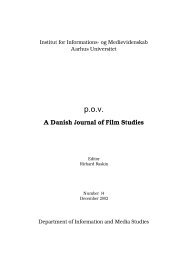The Face of Time - POV - Aarhus Universitet
The Face of Time - POV - Aarhus Universitet
The Face of Time - POV - Aarhus Universitet
You also want an ePaper? Increase the reach of your titles
YUMPU automatically turns print PDFs into web optimized ePapers that Google loves.
76 p.o.v. number 13 March 2002<br />
another student short fiction, <strong>The</strong> Tram (Tramwaj, 1966). Most <strong>of</strong> his<br />
early films in the 60s and 70s were short documentary films with a<br />
strong, though <strong>of</strong>ten subdued, political critique and satire. Nevertheless,<br />
many <strong>of</strong> them were banned by the communist regime. Films<br />
like <strong>The</strong> Photograph (Zdjecie, 1968), From the City <strong>of</strong> Lodz (Z miasta<br />
Lodzi, 1969) – his graduation film from the Lodz Film school – I was<br />
a Soldier (Bylem Zolnierzem, 1970), Factory (Fabryka, 1970), Refrain<br />
(Refren, 1972), and perhaps his most well–known one, From a Night<br />
Porter’s Point <strong>of</strong> View (Z punktu widzenia nocnego portiera, 1978),<br />
were all short, insightful, <strong>of</strong>ten subdued satirical or lyrical portraits<br />
<strong>of</strong> everyday life in Poland.<br />
But Kieslowski also made longer documentaries such as Workers<br />
’71 (Robotnicy ‘71,1972), in which Kieslowski tries to portray the<br />
mentality <strong>of</strong> the working class at the time <strong>of</strong> the strikes and rebellion<br />
against Gomulka; the drama-documentary experiment Curriculum<br />
Vitae (Zyciorys, 1975), where a real party committee interrogates an<br />
actor in a fictional story; or I don’t know (Nie wiem, 1977), with its<br />
confessions <strong>of</strong> a former factory manager. <strong>The</strong>se films are very direct<br />
visual snapshots <strong>of</strong> reality in a Communist society, and <strong>of</strong>ten with a<br />
sharp political edge.<br />
Even in his first feature films such as Scar (Blizna, 1976), about<br />
industrial disasters in the name <strong>of</strong> social welfare and development,<br />
or Camera Buff (Amator, 1979), a satire on political censorship in<br />
Poland, Kieslowski continues a clear political agenda, but again<br />
<strong>of</strong>ten with extensive use <strong>of</strong> visual symbolism and a very nonutopian<br />
political ideology. He is more interested in the ways in<br />
which contradictions always seem to appear, no matter what kind <strong>of</strong><br />
system we talk about. <strong>The</strong> fall <strong>of</strong> the wall and the end <strong>of</strong><br />
communism did not inspire a more positive outlook on life in



